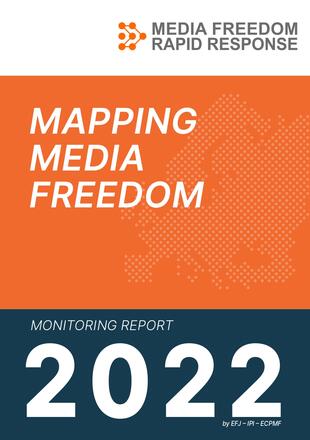
Over the past year, the situation of media freedom and pluralism continued to worsen, as journalists and media workers had to deal with increasing pressure, intimidation and threats. From January to December 2022, the Media Freedom Rapid Response (MFRR) registered 813 cases of media freedom violations, 415 of which took place in EU member states, and 398 in candidate countries. The most frequent types of incidents were verbal assaults (42,4%), followed by legal (27,2%) and physical attacks (20.5%). In 37% of the cases, attacks came from private individuals, while 17,1% from government and public officials and 11,3% from the police and state security agents.
The most serious violations were recorded in candidate countries, where MFRR registered the death of 10 professionals: 9 journalists and media workers were killed in Ukraine while covering war news, while 1 managing director of a newspaper was murdered in Turkey.
After providing a general overview of media freedom violations, the Report dedicates thematic sections to four major developments that occurred in 2022.
The first thematic section covers the dreadful effects that the Russian full-scale invasion of Ukraine had on journalism and press freedom. Since the outbreak of the war in late February 2022, MFRR has recorded 140 media freedom violations, most of which were physical attacks on journalists and media workers (66 cases). Nine journalists were killed while reporting from the front lines, making 2022 the deadliest year for journalists in Europe in several decades. Although most of the violations were perpetrated by Russian military forces, Ukrainian authorities were responsible for some cases of illegitimate press restriction as well.
The second section is dedicated to abusive legal action against journalists and media outlets. In the year when the European Commission advanced a EU anti-SLAPP directive, the number of vexatious lawsuits against media professionals grew in a distressing way: MFRR recorded 47 cases, ranging from civil to criminal lawsuits. Turkey remains the most problematic country when it comes to criminal prosecution: 22 out of the 29 convictions of journalists recorded in 2022 occurred in the country. Italy, France and Greece are also among the countries that cause the greatest concern when it comes to SLAPPs and abusive legal actions.
The third thematic chapter deals with online attacks. In 2022, there was a significant increase in the number of incidents occurring in the digital sphere: while in 2021 online attacks accounted for 14,1% of media freedom violations, in 2022 the data rose to 20,7%, with 158 recorded cases affecting 261 journalists and media outlets. Online intimidations include harassment, disinformation campaigns - mostly from Russia as part of its propaganda effort to promote and justify the war in Ukraine - and surveillance through spyware such as Pegasus or Predator. In some cases, journalists also received online death threats against themselves and members of their families.
The last thematic section is dedicated to media freedom violations related to environmental reporting. Throughout 2022, 17 incidents affected journalists covering climate and environmental topics, 12 in the EU and 5 in candidate countries. Also in this case, violations range from physical attacks to verbal threats or arrest.
The final chapter of the Report provides an overview of the most relevant threats and challenges to media freedom in ten EU countries (Belgium, Estonia, France, Germany, Greece, Hungary, Italy, Poland, Spain and Sweden) and four candidates (Albania, Norths Macedonia, Serbia and Turkey).
Tags: Media freedom Safety of journalists Harassment Surveillance War reportingThe content of this article can be used according to the terms of Creative Commons: Attribution-NonCommercial 4.0 International (CC BY-NC 4.0) . To do so use the the wording "this article was originally published on the Resource Centre on Media Freedom in Europe" including a direct active link to the original article page.

